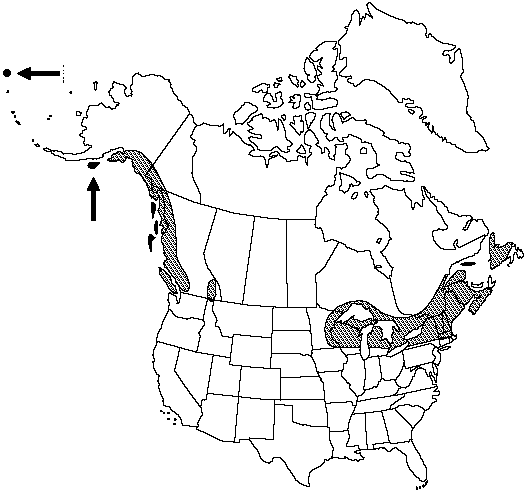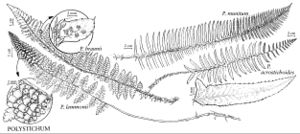Difference between revisions of "Polystichum braunii"
5: 278. 1852.
FNA>Volume Importer |
imported>Volume Importer |
||
| (7 intermediate revisions by 2 users not shown) | |||
| Line 7: | Line 7: | ||
}} | }} | ||
|common_names=Braun's holly fern;polystic de braun | |common_names=Braun's holly fern;polystic de braun | ||
| − | |basionyms={{Treatment/ID/ | + | |special_status={{Treatment/ID/Special_status |
| + | |code=F | ||
| + | |label=Illustrated | ||
| + | }} | ||
| + | |basionyms={{Treatment/ID/Basionym | ||
|name=Aspidium braunii | |name=Aspidium braunii | ||
|authority=Spenner | |authority=Spenner | ||
| + | |rank=species | ||
| + | |publication_title=Fl. Friburg. | ||
| + | |publication_place=1: 9, plate 2. 1825 | ||
}} | }} | ||
|synonyms={{Treatment/ID/Synonym | |synonyms={{Treatment/ID/Synonym | ||
|name=Polystichum braunii subsp. purshii | |name=Polystichum braunii subsp. purshii | ||
|authority=(Fernald) Calder & Roy L. Taylor | |authority=(Fernald) Calder & Roy L. Taylor | ||
| − | }}{{Treatment/ID/Synonym | + | |rank=subspecies |
| + | }} {{Treatment/ID/Synonym | ||
|name=Polystichum braunii var. purshii | |name=Polystichum braunii var. purshii | ||
|authority=Fernald | |authority=Fernald | ||
| + | |rank=variety | ||
}} | }} | ||
|hierarchy=Dryopteridaceae;Polystichum;Polystichum braunii | |hierarchy=Dryopteridaceae;Polystichum;Polystichum braunii | ||
| Line 25: | Line 34: | ||
}}<!-- | }}<!-- | ||
| − | --><span class="statement" id="st- | + | --><span class="statement" id="st-undefined" data-properties=""><b>Stems </b>erect. <b>Leaves</b> monomorphic, arching, 2–10 dm; bulblets absent. <b>Petiole</b> 1/8–1/6 length of leaf, densely scaly; scales light brown, gradually diminishing in size distally. <b>Blade</b> broadly lanceolate, 2-pinnate; base narrowed. <b>Pinnae</b> oblong-lanceolate or falcate, proximal pinnae ± rectangular, not overlapping, in 1 plane, 2–10 cm; base oblique except proximal 3–4 pinnae, where auricles not developed; apex acute, subapical and apical teeth same size; microscales filiform to linear, lacking projections, dense abaxially, sparse adaxially. <b>Pinnules</b> ± stalked, short-falcate to oblique-rhombic, acroscopic auricle well developed on proximal pinnules; margins dentate, with slender bristle tips; apex broadly acute. <b>Indusia</b> ciliate. <b>Spores</b> brown. <b>2n</b> = 164.</span><!-- |
-->{{Treatment/Body | -->{{Treatment/Body | ||
|habitat=Moist places in boreal forests, interior moist forests | |habitat=Moist places in boreal forests, interior moist forests | ||
|elevation=0–300 m | |elevation=0–300 m | ||
| − | |distribution=St. Pierre and Miquelon;B.C.;N.B.;Nfld.;N.S.;Ont.;Que.;Yukon;Alaska;Conn.;Idaho;Maine;Mass.;Mich.;Minn.;N.H.;N.Y.;Vt.;Wis.;Eurasia. | + | |distribution=St. Pierre and Miquelon;B.C.;N.B.;Nfld. and Labr. (Nfld.);N.S.;Ont.;Que.;Yukon;Alaska;Conn.;Idaho;Maine;Mass.;Mich.;Minn.;N.H.;N.Y.;Vt.;Wis.;Eurasia. |
| − | |discussion=<p>Because no diploid ancestors have been found, Polystichum braunii is thought to be an ancient tetraploid. Its sterile hybrid with P. acrostichoides, P. × potteri, is discussed under P. acrostichoides. Polystichum braunii × lonchitis has been reported from southeast Alaska (S. L. Welsh 1974). This hybrid has been cytologically confirmed in Europe and named P. × meyeri Sleep & Reichstein (A. Sleep and T. Reichstein 1967). It has narrower and less divided leaves than P. braunii and poorly developed auricles. Polystichum braunii × lonchitis was described by J. Ewan (1944), but the type (from British Columbia) is P. braunii × munitum (A. Sleep and T. Reichstein 1967). This latter hybrid is the postulated progenitor of P. setigerum (D. H. Wagner 1979). North American P. braunii has been segregated as var. purshii Fernald, distinguished from European populations (var. braunii) by having broader microscales.</p> | + | |discussion=<p>Because no diploid ancestors have been found, <i>Polystichum braunii</i> is thought to be an ancient tetraploid. Its sterile hybrid with <i>P. acrostichoides</i>, P. × potteri, is discussed under <i>P. acrostichoides</i>. <i>Polystichum braunii</i> × lonchitis has been reported from southeast Alaska (S. L. Welsh 1974). This hybrid has been cytologically confirmed in Europe and named P. × meyeri Sleep & Reichstein (A. Sleep and T. Reichstein 1967). It has narrower and less divided leaves than <i>P. braunii</i> and poorly developed auricles. <i>Polystichum braunii</i> × lonchitis was described by J. Ewan (1944), but the type (from British Columbia) is <i>P. braunii</i> × munitum (A. Sleep and T. Reichstein 1967). This latter hybrid is the postulated progenitor of <i>P. setigerum</i> (D. H. Wagner 1979). North American <i>P. braunii</i> has been segregated as <i></i>var.<i> purshii</i> Fernald, distinguished from European populations (var. braunii) by having broader microscales.</p> |
|tables= | |tables= | ||
|references= | |references= | ||
| Line 40: | Line 49: | ||
-->{{#Taxon: | -->{{#Taxon: | ||
name=Polystichum braunii | name=Polystichum braunii | ||
| − | |||
|authority=(Spenner) Fée | |authority=(Spenner) Fée | ||
|rank=species | |rank=species | ||
| Line 49: | Line 57: | ||
|habitat=Moist places in boreal forests, interior moist forests | |habitat=Moist places in boreal forests, interior moist forests | ||
|elevation=0–300 m | |elevation=0–300 m | ||
| − | |distribution=St. Pierre and Miquelon;B.C.;N.B.;Nfld.;N.S.;Ont.;Que.;Yukon;Alaska;Conn.;Idaho;Maine;Mass.;Mich.;Minn.;N.H.;N.Y.;Vt.;Wis.;Eurasia. | + | |distribution=St. Pierre and Miquelon;B.C.;N.B.;Nfld. and Labr. (Nfld.);N.S.;Ont.;Que.;Yukon;Alaska;Conn.;Idaho;Maine;Mass.;Mich.;Minn.;N.H.;N.Y.;Vt.;Wis.;Eurasia. |
|reference=None | |reference=None | ||
|publication title= | |publication title= | ||
|publication year=1852 | |publication year=1852 | ||
| − | |special status= | + | |special status=Illustrated |
| − | |source xml=https:// | + | |source xml=https://bitbucket.org/aafc-mbb/fna-data-curation/src/2e0870ddd59836b60bcf96646a41e87ea5a5943a/coarse_grained_fna_xml/V2/V2_248.xml |
|genus=Polystichum | |genus=Polystichum | ||
|species=Polystichum braunii | |species=Polystichum braunii | ||
| − | |||
| − | |||
| − | |||
| − | |||
| − | |||
| − | |||
| − | |||
| − | |||
| − | |||
| − | |||
| − | |||
| − | |||
| − | |||
| − | |||
| − | |||
| − | |||
| − | |||
| − | |||
| − | |||
| − | |||
| − | |||
| − | |||
| − | |||
| − | |||
| − | |||
| − | |||
| − | |||
| − | |||
| − | |||
| − | |||
| − | |||
| − | |||
}}<!-- | }}<!-- | ||
-->[[Category:Treatment]][[Category:Polystichum]] | -->[[Category:Treatment]][[Category:Polystichum]] | ||
Latest revision as of 20:22, 5 November 2020
Stems erect. Leaves monomorphic, arching, 2–10 dm; bulblets absent. Petiole 1/8–1/6 length of leaf, densely scaly; scales light brown, gradually diminishing in size distally. Blade broadly lanceolate, 2-pinnate; base narrowed. Pinnae oblong-lanceolate or falcate, proximal pinnae ± rectangular, not overlapping, in 1 plane, 2–10 cm; base oblique except proximal 3–4 pinnae, where auricles not developed; apex acute, subapical and apical teeth same size; microscales filiform to linear, lacking projections, dense abaxially, sparse adaxially. Pinnules ± stalked, short-falcate to oblique-rhombic, acroscopic auricle well developed on proximal pinnules; margins dentate, with slender bristle tips; apex broadly acute. Indusia ciliate. Spores brown. 2n = 164.
Habitat: Moist places in boreal forests, interior moist forests
Elevation: 0–300 m
Distribution

St. Pierre and Miquelon, B.C., N.B., Nfld. and Labr. (Nfld.), N.S., Ont., Que., Yukon, Alaska, Conn., Idaho, Maine, Mass., Mich., Minn., N.H., N.Y., Vt., Wis., Eurasia.
Discussion
Because no diploid ancestors have been found, Polystichum braunii is thought to be an ancient tetraploid. Its sterile hybrid with P. acrostichoides, P. × potteri, is discussed under P. acrostichoides. Polystichum braunii × lonchitis has been reported from southeast Alaska (S. L. Welsh 1974). This hybrid has been cytologically confirmed in Europe and named P. × meyeri Sleep & Reichstein (A. Sleep and T. Reichstein 1967). It has narrower and less divided leaves than P. braunii and poorly developed auricles. Polystichum braunii × lonchitis was described by J. Ewan (1944), but the type (from British Columbia) is P. braunii × munitum (A. Sleep and T. Reichstein 1967). This latter hybrid is the postulated progenitor of P. setigerum (D. H. Wagner 1979). North American P. braunii has been segregated as var. purshii Fernald, distinguished from European populations (var. braunii) by having broader microscales.
Selected References
None.
